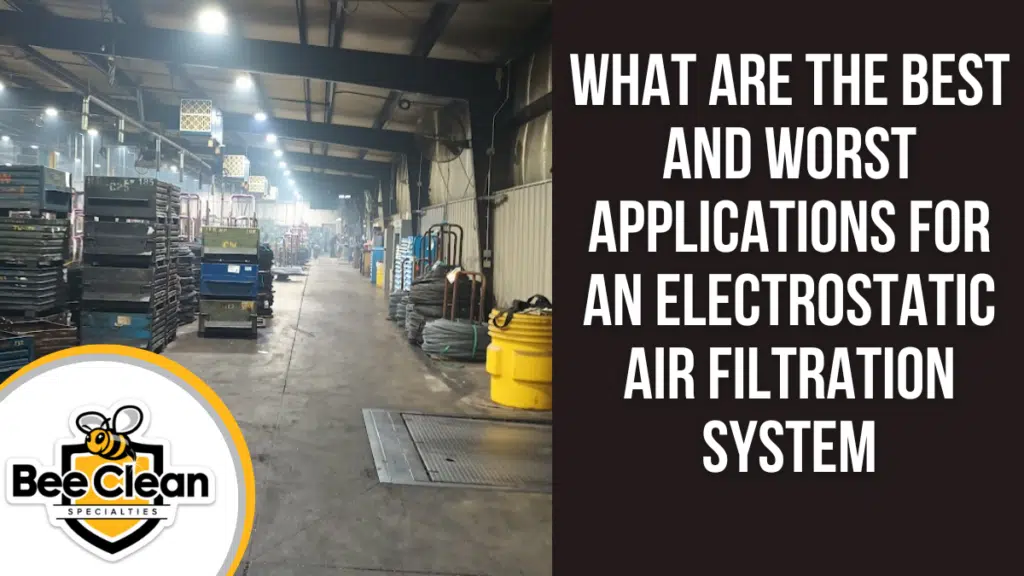What are the Best (and Worst) Applications for an Electrostatic Air Filtration System

Electrostatic air filtration systems use a unique method of filtering the air, which makes them shine in certain applications. However, there are also many applications that are not ideal, or even dangerous for using electrostatic air filtration. This article will go through both the best and worst applications for this type of filtration system.
Great Applications:
- Oil Smoke: thermally generated oil smoke can be a very difficult pollutant to capture, because of the extremely small particulate size, and the fact that it is a wet particle, and often sticky.
Some common sources of oil smokes are:
- Cold Forming: Oil is used to cool the dies and parts in cold headers, and other cold forming applications. When this coolant is heated by the rapid compression of metal it generates smoke.
- Precision Machining: High-speed machining generates a lot of heat, especially on hard materials like (). Often oil coolant is used to extend tool life and provide a good finish, but it also creates oil smoke and mist, especially if it is a high-pressure coolant system.
- Tool Grinding: Wet grinding of hardened tools such as cutting tools for CNC machines, creates a large amount of oil smoke and mist because of the hard material and the high-pressure lubricants.
- Centerless Grinding: Centerless grinding with oil-based coolants creates a large amount of oil smoke, as well as small grit from the metal and the grinding wheel, this makes it an especially hard application for any type of air filtration system.
- Food Production: whether it is a restaurant, or an industrial food production facility, if both heat and oil are present, oil smoke will be generated.
- Plastic and Rubber manufacturing: Some processes of plastic or rubber production create oil smoke. Some types of processes create a smoke that once collected it thickens into a tar-like substance. This is difficult for any type of filtration, to effectively collect, but with proper maintenance, an electrostatic filter is your best option.
- Blow Molding
- Extruding
- Vulcanizing
- Heat Treat: Heat treating parts is another process that can generate oil smoke. If the parts being treated are coated or quenched in oil, especially if they are made out of powdered metal – the porous nature of the metal absorbs a lot of oil.
Good Applications
- Water Coolant Mist: Water based coolants can create an extremely fine mist, especially when used in high-pressure coolant systems. Electrostatics can also be effective in this application. However, because of waters conductivity and the way electrostatic filters work, it is important to pick the right kind of electrostatic filter, and maintain it on a schedule.
Another important aspect is to bring in some room air to reduce the relative humidity prior to the electrostatic filter.
Some common sources of coolant mists are:
- CNC machining: A lot of CNC machining uses water-based coolant, and when this coolant is sprayed on the part and the tool, it atomizes and becomes a very fine mist.
- Centerless Grinding: Centerless grinding with water-based coolant produces a large amount of coolant mist as well as small particles from the metal and the grinding wheel.
- Welding Fume: While electrostatic filtration is no longer the recommended method of collecting welding fume, it is still a relatively good option. Electrostatic filters have no issue collecting the weld fume, but if the filters short out, or a power supply fails, the dry nature of the collected particles allow them to reentrain into the airstream. Weld smoke/fume also stains electrostatic cells, which does not negatively affect their performance, but does affect their appearance.
Bad Applications:
- Explosive dusts: Electrostatic filters are not ideal for collecting any type of dust (dry particles) because the particles can reenter the airstream if something shorts out a filter or a power supply goes bad. Explosive dusts are especially bad, because electrostatic filters use high voltage to collect particles, and if particulate bridges between the high voltage and ground, it produces a strong arc, which is enough to explode many types of explosive powders.
Some common sources for explosive dusts are:
- Metal Grinding: Especially aluminum, and magnesium, but many other types of metal dusts are at least somewhat explosive.
- Food Production: Any food production where bulk powders like flour, sugar, or cornstarch are handled, need to have a dust collector with a proper explosion control system.
- Wood sanding/cutting: Any fine type of sawdust is combustible. Also includes paper and cardboard production.
- Corrosive Materials: Electrostatic filters use aluminum collection cells, ionizers, and prefilters. Some contaminants have pollutants that are corrosive to aluminum. While the electrostatic systems still able to collect this pollutant, the filter elements will deteriorate, and are quite costly to replace.
If you have any questions about a specific application, give us a call. 888.451.0844.